On my way out of There Will Be Blood, I thought the ludicrous ending might’ve spawned a goofy catchphrase, and this song was the first thing that came to mind. Sure enough, someone’s taken that ball and ran with it. Draaaaainage! (See also I Drink Your Milkshake!, via THND.) Update: More of the same.
Tag: Daniel Day-Lewis
Invisible Spinning Globes.
If they hold an awards ceremony in the middle of the ‘Wood and there’s no around to hear it, does it make a sound? Why, yes, yes, it does. And the Golden Globe winners are…
So there you have it. In case you missed it, my own best of 2007 list is now buried deep beneath the political coverage.
2007 in Film.
Happy New Year, everyone. So unlike last year, when I took an extra month on account of my travels in New Zealand, the Best of 2007 Movie list seems ready to go out on schedule, and it’s below. (If you’ve been reading all the reviews around here, I’m betting the top few choices won’t be a surprise. Still, organizing the 5-15 section was more tough than usual this year.) At any rate, 2008 should be a big orbit around the sun in any event, what with grad school winding down and it being time — at last! — to pick a new president. So a very happy new year to you and yours, and let’s hope the movies of the coming year will contain to sustain, amuse, baffle, and delight.
[2000/2001/2002/2003/2004/2005/2006]


2. No Country for Old Men: It probably won’t do wonders for West Texas tourism. Still, the Coens’ expertly-crafted No Country works as both a visceral exercise in dread and a sobering philosophical rumination on mortality and the nature of evil. (And in his chilling portrayal of Anton Chigurh, Javier Bardem has crafted a movie villain for the ages.) People sometimes refer to Coen movies as “well-made” as a dig, as if the brothers were just soulless clinically-minded technicians. I couldn’t disagree with that assessment more. Still, No Country for Old Men seems so seamless and fully formed, so judicious and economical in its storytelling, that it reminds me of Salieri’s line in Amadeus: “Displace one note and there would be diminishment, displace one phrase and the structure would fall.” A dark journey that throbs with a jagged pulse, No Country for Old Men is very close to the best film of the year, and — along with Miller’s Crossing, Fargo, and The Big Lebowski — yet another masterpiece sprung from the Coens’ elegant and twisted hive-mind. Bring on Burn After Reading.

3. The Diving Bell and the Butterfly: Through the wonders of cinematic alchemy, Julian Schnabel took the sad real-life account of Vogue editor Jean-Do Bauby’s horrific imprisonment within his own body and made it soar. No other film this year put the “locked-in” experience of taking in a movie as inventively in service of its story (although I kinda wish Atonement had tried.) Special kudos to Mathieu Almaric for conveying so much with so little to work with, and to Max von Sydow for his haunting turn as Bauby’s invalid father. And, lest someone holds “arthouse foreign film” against it, Diving Bell is both much funnier and more uplifting than anyone might expect of a tale about hospital paralysis. Salut.
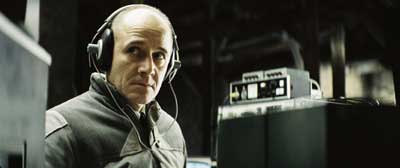
[3.] The Lives of Others: The one hold-over from 2006 on the list this year (I was pretty thorough about catching up before posting last January, although I still never did see Inland Empire), The Lives of Others is a timely and compelling parable of art, politics, surveillance, and moral awakening in the final days of the Stasi. In a way, Lives is an East German counterpart to Charlie Wilson’s War, a story about how even small political acts of individual conscience can change the world, even (or perhaps especially) in a decaying Orwellian state. With a memorable central performance by Ulrich Muhe and a languid conclusion that ends on exactly the right note, the resoundingly humanist Lives of Others is a Sonata for a Good Man in Bad Times. We could use more of its ilk.

4. Knocked Up: Judd Apatow’s sweet, good-natured take on modern love and unwanted pregnancy was probably the most purely satisfying film of the summer. As funny in its pop-culture jawing as it was well-observed in its understanding of relationship politics, Knocked Up also felt — unlike the well-meaning but overstylized Juno, the film it’ll most likely be paired with from now herein — refreshingly real. As I said in my recent review of Walk Hard, an eventual Apatow backlash seems almost inevitable given how many comedies he has on the 2008 slate. Nevertheless, we’ll always have Freaks & Geeks, and we’ll always have Knocked Up.

5. The Bourne Ultimatum: The third installment of the Bourne franchise was the best blockbuster of the year, and proved that director Paul Greengrass can churn out excellent, heart-pounding fare even when he’s basically repeating himself. Really, given how much of Ultimatum plays exactly like its two predecessors on the page — the car chase, the Company Men, the Eurotrash assassin, Julia Stiles, exotic locales and cellphone hijinx — it’s hard to fathom how good it turned out to be. But Bourne was riveting through and through…You just couldn’t take your eyes off it. I know I’ve said this several times now, but if Zack Snyder screws up Watchmen (and I’d say the odds are 50-50 at this point), the lost opportunity for a Greengrass version will rankle for years.

6. Zodiac: The best film of the spring. What at first looked to be another stylish David Fincher serial killer flick is instead a moody and haunting police procedural about the search for a seemingly unknowable truth, and the toll it exacts on the men — cops, journalists, citizens — who undertake it for years and even decades. Reveling in the daily investigatory minutiae that also comprise much of The Wire and Law and Order, and arguably boasting the best ensemble cast of the year, Zodiac is a troubling and open-ended inquiry that, until perhaps the final few moments, offers little in the way of satisfying closure for its characters or its audience. Whatever Dirty Harry may suggest to the contrary, the Zodiac remains elusive.

7. 28 Weeks Later: Sir, we appear to have lost control of the Green Zone…Shall I send in the air support? Zombie flicks have been a choice staple for political allegory since the early days of Romero, but one of the strengths of Juan Carlos Fresnadillo’s merciless 28 Weeks Later — perhaps the best horror sequel since James Cameron’s Aliens — is that it foregoes the 1:1 sermonizing about failed reconstructions and American hubris whenever it gets in the way of the nightmare scenario at hand. (Besides, if you wanted to see explicit muckraking about current events this year, there were options aplenty, from In the Valley of Elah to No End in Sight, although plenty of this year’s politically-minded forays — Rendition, Lions for Lambs — looked rather inert from a distance.) There’s little time for moralizing in the dark, wretched heart of 28 Weeks Later: In fact, the right thing to do is often suicide, or worse. You pretty much have only one viable option: run like hell.

8. In the Valley of Elah: Paul Haggis’ surprisingly unsentimentalized depiction of the hidden costs of war for the homefront, Elah benefits greatly from Tommy Lee Jones’ slow burn as a military father who’s lost his last son to a horrific murder. In fact, it’s hard not to think of Jones’ inspired performances here and in No Country of a piece. There was something quintessentially America-in-2007 about Jones this year. In every crease and furrow of this grizzled Texan’s visage, we can see the wounds and weariness of recent times, the mask of dignity and good humor beginning to slip in the face of tragic events and colossal stupidity. Jones is masterful in Elah, and while Daniel Day-Lewis seems to be garnering most of the accolades for There Will Be Blood and Philip Seymour Hoffman stunned in three pics this fall (all on the list below), I’d put Jones’ work here as the best of the year.

9. There Will Be Blood: Ah, the maddening There Will Be Blood. I just reviewed this one yesterday, so it’s doubtful my opinion on it has changed much. But what Anderson’s film reminds me of most at the moment (and not only for the Daniel Day-Lewis connection) is Scorsese’s Gangs of New York, a movie I reviewed at the end of 2002 and then bumped up a few spots a week later when writing the 2002 list, thinking that its flaws would diminish over time. They haven’t — if anything, they’re just as noticeable as ever. So it may well be with TWBB. Even despite its somewhat unseemly pretensions to greatness, the first hour or so of There Will Be Blood, from the Kubrickian opening to the Days in Heaven-ish burning oil rig, is as powerful and memorable as you could ever want in a film. But TWBB loses its way, and the second half is a significantly less interesting enterprise, ultimately culminating in that goofy, illogical bowling alley ending. I’d characterize Blood as a significant step forward for PTA, and there’s something to be said for getting even this close to a masterpiece. But he hasn’t struck black gold yet.

10. Hot Fuzz: While I personally still prefer Shaun of the Dead, this fish-out-of-water, buddy-cop action spectacle proved the droll British team of Nick Frost, Simon Pegg, and Edgar Wright can’t be considered one-hit-wonders (and that they’re as savvy about certain pop culture tropes as their American colleagues in the Apatow camp.) And, while I didn’t see Elizabeth II: The Golden Age, Hot Fuzz may well include the second-best Cate Blanchett performance of the year.
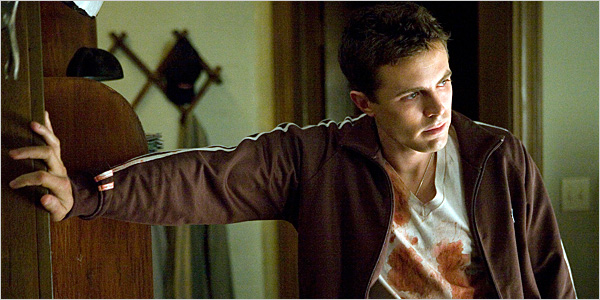
11. Gone Baby Gone: First-time director Ben Affleck acquits himself well with this chronicle of missing children and seedy n’er-do-wells in working-class Boston, wisely choosing to stick with a town and a leading man he knows like the back of his hand. His brother Casey holds his own, and crime author Dennis Lehane’s original source material provides some compelling twists-and-turns throughout. And, as the drug-addled, quick-to-dis Townie mom who’s lost her baby, The Wire‘s Amy Ryan gives arguably the Best Supporting Actress performance of the year (although she’ll likely get some run from Blanchett’s Jude Quinn.)

12. Michael Clayton: Clooney’s impeccable taste in projects continues with this, Tony Gilroy’s meditation on corporate malfeasance and lawyerly ethics (or lack thereof.) The bit with the horses still seems a convenient (and corny) happenstance on which to hang such a major plot point, and I found Tilda Swinton to be overly mannered and distracting for much of the film’s run. But most else about Michael Clayton, from Sidney Pollack’s Master of the Universe to Michael O’Keefe’s snide, unctuous #2 to Tom Wilkinson’s last scene to Clooney not rebounding as well to events as, say, Danny Ocean, rang true. A small film, in its way, but a worthwhile one.
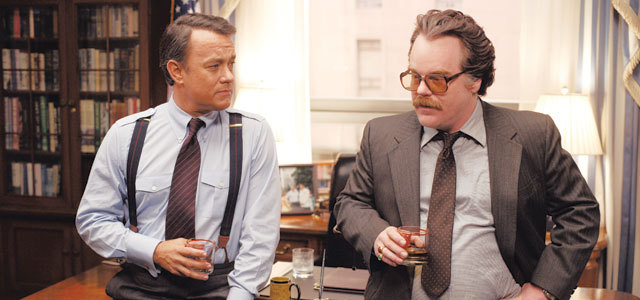
13. Charlie Wilson’s War: Another one I wrote on in the past 24 hours, so I don’t have much to add. Perhaps the best thing about Mike Nichols and Aaron Sorkin’s adaptation of Crile’s book is that it “gets” politics like few recent Washington thrillers I can think of. Philip Seymour Hoffman shows impeccable comic timing as the gruff Gust Avrakotos, and he works very well with Hanks here, who’s gone from being overexposed a few years ago back to a guy I wouldn’t mind seeing more of, particularly if he continues along the Alec Baldwinish character actor path Wilson sometimes suggests could be his future.
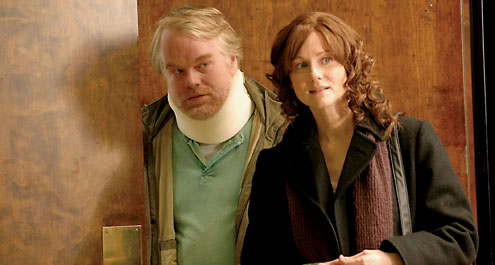
14. The Savages: I actually thought about putting Tamara Jenkins’ The Savages higher on this list, and few other movie endings this year hit me in the gut quite like this one. But, there are definite problems here, such as the wheezy Gbenga Akinnagbe subplot, which compel me to keep it here in the mid-teens. Still, this comedy about an ornery lion in winter, and the battling cubs who have to come to his aid, is a worthwhile one, and particularly if you’re in the mood for some rather black humor. As Lenny the senescent and slipping paterfamilias, Philip Bosco gives a standout performance, as does Hoffman as the miserable Bertholdt Brecht scholar trapped in deepest, darkest Buffalo.
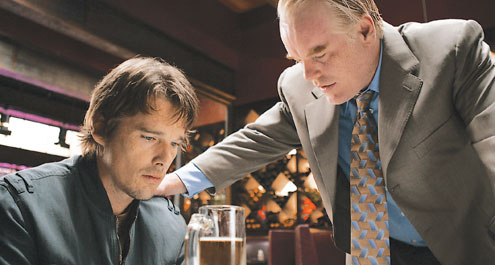
15. Before the Devil Knows You’re Dead: Now, Before the Devil is a movie I did end up seeing twice, on account of Brooklyn friends who were looking to catch it, and the film didn’t bring much new to the table on that second viewing. Still, Sidney Lumet and Kelly Masterson’s lean family tragedy benefits from several excellent performances — most notably by Hoffman, Ethan Hawke, Marisa Tomei, and Albert Finney, but also in supporting work by Amy Ryan, Michael Shannon, Brian O’Byrne, and Rosemary Harris — as well as a memorable Carter Burwell score. (Also, it’s just a coincidence that the three Hoffman movies ended up in a row like this — Still, it’s a testament to the man’s ability that he seemed unique and fully formed in each. Then again, the only time I can think of that Hoffman was actually bad in a film was Cold Mountain, which was pretty glitched up regardless.)

16. Sunshine: Along with There Will Be Blood, Danny Boyle and Alex Garland’s exasperating Sunshine is the other film this year that saw an amazing first hour become undone by breathtakingly poor choices on the back end. Unlike the halting, confused slide of TWBB, though, the moment where Sunshine slips the rails is clear-cut and irrefutable: It’s when what had been a heady science fiction tale about a near-impossible mission to the heart of the sun became instead an unwieldy space-slasher flick, i.e. basically an Armageddon variation on Jason X. The wreckage this subplot makes of what had been a superior hard-sci-fi film is more than a little depressing…Still, for that first hour, Sunshine is really something, perhaps the best realistically-portrayed outer space voyage we’ve seen on-screen in years.
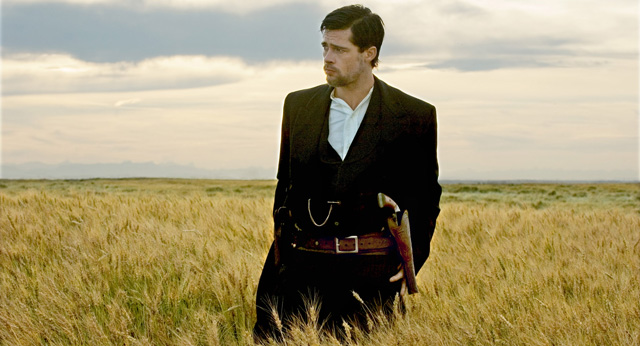
17. The Assassination of Jesse James by the Coward Robert Ford: Andrew Dominik’s sprawling psychological western about the end of the West and the early days of American celebrity-worship is every bit as ambitious and flawed as PTA’s There Will Be Blood. Still, maybe it’s the often stunning Roger Deakins cinematography, or the lively character actors (Sam Rockwell, Jeremy Renner, Garret Dillahunt) in the margins of the film, or maybe it’s even the terrible omniscient voiceover, which is every bit as distracting as the similarly ham-handed one in Little Children, and so goofy at times it verges on endearing. Whatever it is, I warmed to Jesse James more than I probably should, and for whatever reason I feel more willing to forgive it its considerable problems. If you blinked, you probably missed its theatrical run…but maybe it’ll find new life on DVD, when the 160-min running time won’t seem so off-putting.
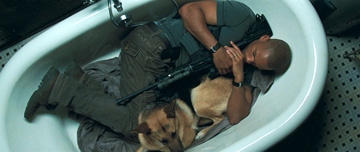
18. I am Legend: When the film focused on Will Smith and his dog fighting blood-sucking and badly rendered CGI Infecteds (whose level of social deevolution changed back and forth solely to accommodate turns in the plot), Francis Lawrence’s I am Legend could seem pedestrian and forgettable. But, when the movie focused on Will Smith and his dog fighting interminable loneliness in an eerily abandoned New York City, which was most of the first two-thirds of the film, I am Legend was a surprisingly melancholy and resonant blockbuster. What can I say? This one hit me where, and how, I live.
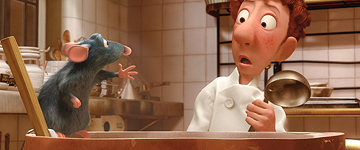
19. Ratatouille: There’s no review of this one up — I actually only saw it on DVD last week. And yet, while Ratatouille is a visual marvel (and Brad Bird and the PIXAR gurus don’t seem to make bad films), I found this nowhere near as inventive or entertaining as their last collaboration, 2004’s The Incredibles. (I’d put this one at about the level of Cars.) Now, this may in part be due to the fact that I have much more interest in comic book conceits than the culinary arts. (I’d even go so far as to say that I find many foodies — particularly those who blather on endlessly about Parisian cuisine — kind of insufferable.) Still, even given my relative lack of interest in the subject matter, Ratatouille bugged me. If “anyone can cook,” as Chef Gustave proclaims, why is no one’s input ever important but the rat? If it’s bad to make money selling pre-cooked (and affordable) food to the teeming masses, as Ian Holm’s character tries to do, why is it any better to do what Remy does? (And why should we care then when he and Gustave Jr. move into a deluxe apartment in the sky? I thought this enterprise wasn’t about making money.) In short, I thought Ratatouille wanted to have it both ways, cloaking a rather elitist, even snobbish story in the trappings of democratic tolerance. And the closing monologue by Peter O’Toole’s Anton Ego, which I thought ostensibly tried to make the movie critic-proof, irked me too. But, all that aside, it does look real purty.
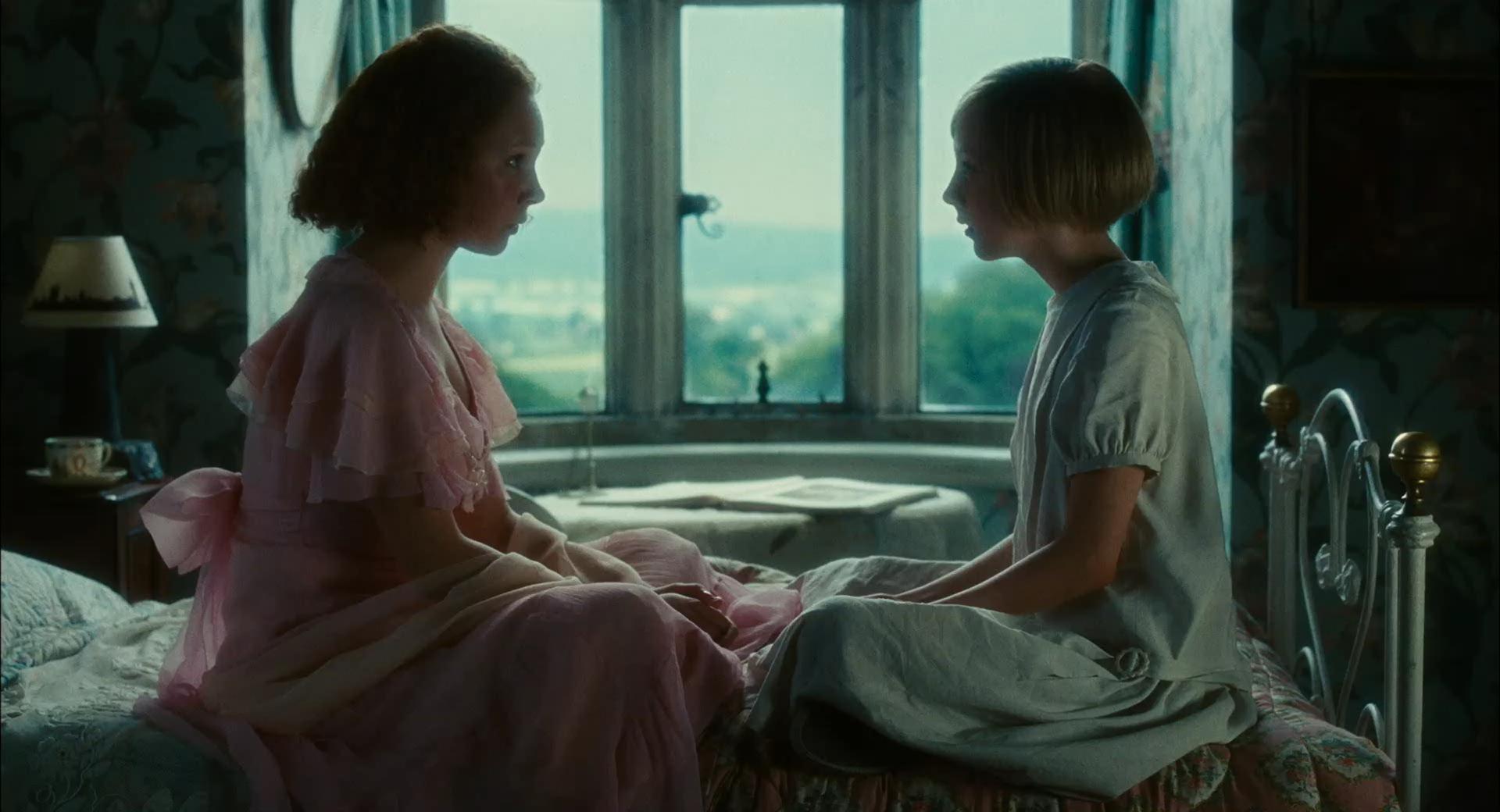
20. Atonement: There were several contenders for this last spot on this list, including Harry Potter and the Order of the Phoenix, The Simpsons Movie, and Jason Reitman’s Juno. But in the end I went with Joe Wright’s take on Ian McEwan’s novel, partly because people I trust who haven’t read the book beforehand haven’t shared my issues with the film. If nothing else, Atonement looks ravishing, and it features breakout performances by James McAvoy, Romola Garai, and Saiorse Ronan. Still, in a year that saw No Country and Diving Bell, I wish Wright had been less conventional in its approach to the story, and found a way to do the gloomy, misanthropic ending of McEwan’s novel justice.
Most Disappointing: The Golden Compass, Grindhouse, Spiderman 3, Southland Tales
Worth a Rental: 3:10 to Yuma, Beowulf, Eastern Promises, Harry Potter and the Order of the Phoenix, Juno, Live Free or Die Hard, Lust, Caution, Ocean’s 13, The Simpsons Movie, Stardust, Superbad, Walk Hard: The Dewey Cox Story
Don’t Bother: 300, Across the Universe, American Gangster, The Darjeeling Limited, Interview, The Invasion, Margot at the Wedding, The Mist, Pirates of the Caribbean 3: At World’s End, Transformers, You Kill Me
Best Actor: Tommy Lee Jones, In the Valley of Elah; Daniel Day-Lewis, There Will Be Blood
Best Actress: Ellen Page, Juno
Best Supporting Actor: Javier Bardem, No Country for Old Men
Best Supporting Actress: Amy Ryan, Gone Baby Gone; Cate Blanchett, I’m Not There
- A Good Year For:
- Casey Affleck (Assassination of Jesse James, Gone Baby Gone)
- Judd Apatow (Knocked Up, Superbad, Walk Hard)
- Josh Brolin (American Gangster, Grindhouse, In the Valley of Elah, No Country)
- Michael Cera (Superbad, Juno)
- Garret Dillahunt (No Country for Old Men, Assassination of Jesse James)
- Full-Frontal Parity (Diving Bell, Eastern Promises, I’m Not There, Walk Hard)
- Philip Seymour Hoffman (Before the Devil, Charlie Wilson’s War, The Savages)
- Tommy Lee Jones (In the Valley of Elah, No Country for Old Men)
- Man’s Best Friend (I am Legend, The Savages)
- Pregnant Hipsters (Knocked Up, Juno)
- Seth Rogen (Knocked Up, Superbad)
- Amy Ryan (Before the Devil, Gone Baby Gone)
- Texans (No Country for Old Men, Charlie Wilson’s War)
- The Western (3:10 to Yuma, Assassination of Jesse James, No Country for Old Men, There Will Be Blood)
- A Bad Year For:
- The Beatles (Across the Universe, Walk Hard)
- Josh Brolin’s PETA standing (American Gangster, No Country for Old Men)
- Great Cities (28 Weeks Later, I am Legend)
- Kidman/Craig Pairings (The Invasion, The Golden Compass)
- The Male Derriere (Charlie Wilson’s War, Margot at the Wedding)
- Standard-Issue Music Biopics(I’m Not There, Walk Hard)
2008: Be Kind, Rewind, Cassandra’s Dream, Cloverfield, The Curious Case of Benjamin Button, The Day the Earth Stood Still, Funny Games, Harold and Kumar Escape from Guantanamo, Harry Potter and the Half-Blood Prince, Hellboy 2: The Golden Army, In Bruges, The Incredible Hulk, Indiana Jones and the Kingdom of the Crystal Skull, Iron Man, James Bond 22, Jumper, Leatherheads, My Blueberry Nights, The Chronicles of Narnia: Prince Caspian, Revolutionary Road, Run, Fat Boy Run, Speed Racer, Star Trek, Valkyrie, Wall-E, Wanted, The X-Files 2…let’s see, am I missing anything…?

Welcome, 2008. I’ll see y’all on the other side.
Citizen Plain.
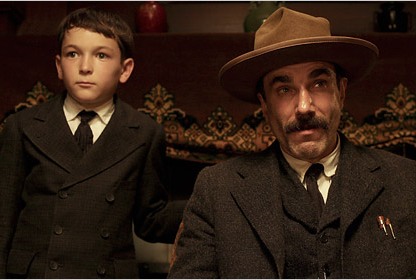 In the opening sequence of Paul Thomas Anderson’s passionate but flawed There Will Be Blood, it is 1898, and a man named Daniel Plainview (Daniel Day-Lewis), alone and driven, casts himself into a dark, dusty hole and hews mineral wealth from the surrounding rock. After suffering a nasty leg injury therein, Plainview hauls himself out of the deep recess through sheer grinding will and, in an act of Herculean exertion rivaling the endgame of Touching the Void, crawls across the sun-baked earth on his back, precious nuggets of silver in hand. This sweating, teeth-gnashing endeavor is an apt metaphor for Anderson’s film. There Will Be Blood looks beautiful, and it has moments of poetry in it. But, like Plainview (and The Assassination of Jesse James, another transplanted 70’s western out this year), it also wears its ambition on its sleeve, and it strains so hard to seem an instant movie classic that it eventually loses its way. (The mostly atonal and distracting Jonny Greenwood score, reminiscent of The Shining, unfortunately doesn’t help.)
In the opening sequence of Paul Thomas Anderson’s passionate but flawed There Will Be Blood, it is 1898, and a man named Daniel Plainview (Daniel Day-Lewis), alone and driven, casts himself into a dark, dusty hole and hews mineral wealth from the surrounding rock. After suffering a nasty leg injury therein, Plainview hauls himself out of the deep recess through sheer grinding will and, in an act of Herculean exertion rivaling the endgame of Touching the Void, crawls across the sun-baked earth on his back, precious nuggets of silver in hand. This sweating, teeth-gnashing endeavor is an apt metaphor for Anderson’s film. There Will Be Blood looks beautiful, and it has moments of poetry in it. But, like Plainview (and The Assassination of Jesse James, another transplanted 70’s western out this year), it also wears its ambition on its sleeve, and it strains so hard to seem an instant movie classic that it eventually loses its way. (The mostly atonal and distracting Jonny Greenwood score, reminiscent of The Shining, unfortunately doesn’t help.)
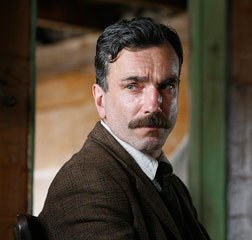 Now, in the interest of full disclosure, Paul Thomas Anderson is a director I’ve never warmed to. I thought Boogie Nights was decent but overlong and I had a visceral dislike for both Magnolia and Punch-Drunk Love. (I haven’t seen Hard Eight.) Still, while I think this is Anderson’s best and most accomplished film, and it’s probably worth sitting through for the first third regardless, There Will Be Blood eventually bogs down in some of the usual PTA indulgences. In addition, Daniel Day-Lewis never gives a bad performance and is typically magnetic here, but he also gets more actorly and mannered as the film progresses, and is loonily over-the-top in Blood‘s disastrously misconceived closing moments. (That being said, I wouldn’t be surprised if “I drink YOUR milkshake!” gets some run in the cultural lexicon of useful and memorable movie quotes.) In short, There Will Be Blood is a good film, in some ways even a very good one. But it’s not the landmark masterpiece many reviewers are making it out to be, and it slips into murk well before the end.
Now, in the interest of full disclosure, Paul Thomas Anderson is a director I’ve never warmed to. I thought Boogie Nights was decent but overlong and I had a visceral dislike for both Magnolia and Punch-Drunk Love. (I haven’t seen Hard Eight.) Still, while I think this is Anderson’s best and most accomplished film, and it’s probably worth sitting through for the first third regardless, There Will Be Blood eventually bogs down in some of the usual PTA indulgences. In addition, Daniel Day-Lewis never gives a bad performance and is typically magnetic here, but he also gets more actorly and mannered as the film progresses, and is loonily over-the-top in Blood‘s disastrously misconceived closing moments. (That being said, I wouldn’t be surprised if “I drink YOUR milkshake!” gets some run in the cultural lexicon of useful and memorable movie quotes.) In short, There Will Be Blood is a good film, in some ways even a very good one. But it’s not the landmark masterpiece many reviewers are making it out to be, and it slips into murk well before the end.
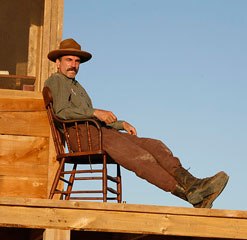 Straying rather far from the Upton Sinclair tome that inspired it, Blood is, in effect, a character study about the dehumanizing consequences of naked ambition. (If that sounds like Citizen Kane, you’re on the right track. PTA is borrowing from Welles, Malick, and Kubrick rather than Altman or Scorsese this time ’round.) After the 1898 prologue, we pick up Daniel Plainview’s story a few years later: He’s moved from silver to oil and has been successful enough to hire on a few workers, one of whom has brought his infant child with him on the dig. Alas, tragedy — a pretty common occurrence in the turn-of-the-century oil business, it seems — strikes at the workplace, and the child becomes Plainview’s. By 1911, this now ten-year-old boy (Dillon Freaser) has become a valuable part of the family business — He’s the silent partner Plainview uses to soften his pitch when dealing with locals or landowners. In any event, the oilman (as he prefers to be known) one day gets a tip from a traveler (Paul Dano) about a town where the black gold literally seeps from the ground. Soon, the Plainviews set up shop in this California hamlet, named Little Boston, and start buying up the place. But standing in his way is another ambitious soul, the evangelical preacher Eli Sunday (also Paul Dano), and he doesn’t want a rival for the town’s admiration. There’s only room for one Great Man in Little Boston…but will his symbol be the Derrick or the Cross?
Straying rather far from the Upton Sinclair tome that inspired it, Blood is, in effect, a character study about the dehumanizing consequences of naked ambition. (If that sounds like Citizen Kane, you’re on the right track. PTA is borrowing from Welles, Malick, and Kubrick rather than Altman or Scorsese this time ’round.) After the 1898 prologue, we pick up Daniel Plainview’s story a few years later: He’s moved from silver to oil and has been successful enough to hire on a few workers, one of whom has brought his infant child with him on the dig. Alas, tragedy — a pretty common occurrence in the turn-of-the-century oil business, it seems — strikes at the workplace, and the child becomes Plainview’s. By 1911, this now ten-year-old boy (Dillon Freaser) has become a valuable part of the family business — He’s the silent partner Plainview uses to soften his pitch when dealing with locals or landowners. In any event, the oilman (as he prefers to be known) one day gets a tip from a traveler (Paul Dano) about a town where the black gold literally seeps from the ground. Soon, the Plainviews set up shop in this California hamlet, named Little Boston, and start buying up the place. But standing in his way is another ambitious soul, the evangelical preacher Eli Sunday (also Paul Dano), and he doesn’t want a rival for the town’s admiration. There’s only room for one Great Man in Little Boston…but will his symbol be the Derrick or the Cross?
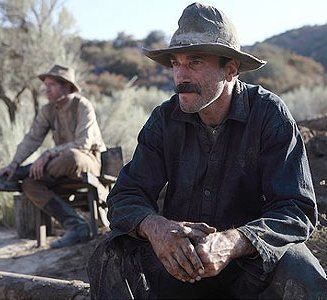 So, as you can see, what we have here is John D. Rockefeller versus Elmer Gantry, commerce versus religion, another virulent intersection of the black gold, texas tea and that old-time fundamentalist religion. But don’t go in expecting Syriana in Progressive Era California just yet. In fact, Blood turns out to be barely political at all. (Somewhere, Sinclair sighs.) Anderson puts several interesting ideas and characters in play, and the first third of the movie is absolutely gripping stuff. But, unfortunately, once all the derricks are in a row, Anderson doesn’t seem to know what to do with them. And so, right around the time Plainview’s first rig goes up in flames, There Will Be Blood begins to stall out. There are some clever reversals in the oilman-churchman balance of power thereafter (the baptism scene, for example), but the movie doesn’t really go anywhere. Instead, for most of the rest of the film, PTA goes back to his well and focuses once again on his pet issue, the meaning and importance of family. (See also Magnolia, Boogie Nights, and, from what I’ve heard, Hard Eight.) He brings a long-lost half-brother (Kevin O’Connor) into the story, has Plainview take extreme umbrage at any suggestion he’s a deadbeat dad, and starts dwelling on the brewing discord and enmity between father and son. (Also a major factor in Oil!, although it’s done rather differently.) Of course, Anderson can be forgiven for concentrating on what most interests him, and plenty of very good directors — maybe even all of ’em — have a tendency to keep ruminating on the same thematic content. Still, given how intriguing There Will Be Blood plays for its first hour, it’s a significant letdown to see PTA fall back into the same old, same old.
So, as you can see, what we have here is John D. Rockefeller versus Elmer Gantry, commerce versus religion, another virulent intersection of the black gold, texas tea and that old-time fundamentalist religion. But don’t go in expecting Syriana in Progressive Era California just yet. In fact, Blood turns out to be barely political at all. (Somewhere, Sinclair sighs.) Anderson puts several interesting ideas and characters in play, and the first third of the movie is absolutely gripping stuff. But, unfortunately, once all the derricks are in a row, Anderson doesn’t seem to know what to do with them. And so, right around the time Plainview’s first rig goes up in flames, There Will Be Blood begins to stall out. There are some clever reversals in the oilman-churchman balance of power thereafter (the baptism scene, for example), but the movie doesn’t really go anywhere. Instead, for most of the rest of the film, PTA goes back to his well and focuses once again on his pet issue, the meaning and importance of family. (See also Magnolia, Boogie Nights, and, from what I’ve heard, Hard Eight.) He brings a long-lost half-brother (Kevin O’Connor) into the story, has Plainview take extreme umbrage at any suggestion he’s a deadbeat dad, and starts dwelling on the brewing discord and enmity between father and son. (Also a major factor in Oil!, although it’s done rather differently.) Of course, Anderson can be forgiven for concentrating on what most interests him, and plenty of very good directors — maybe even all of ’em — have a tendency to keep ruminating on the same thematic content. Still, given how intriguing There Will Be Blood plays for its first hour, it’s a significant letdown to see PTA fall back into the same old, same old.
 Unfortunately, once the spell of Blood is broken, other bad habits of Anderson’s start becoming harder to ignore. Clearly good about giving actors room to breathe (maybe too much room, given DDL’s going off the rails in the final reel here), Anderson can also be distractingly showy (the Scorsese steadicam business in Boogie Nights, for example.) He has a tendency to beat quirky ideas into the ground (Exodus 8:2, the harmonium in Punch-Drunk Love), can hinge a sequence on some really lousy dialogue (“I’m silently judging you“), and often lets scenes meander for several beats too long (anything involving the quiz show in Magnolia.) These tics are more subdued in There Will Be Blood than in any of Anderson’s previous movies, but they become manifest as the film loses focus, and well up with explosive force in the last act. Set in 1927, with Plainview now a wealthy but dissolute drunk in his own Xanadu and Sunday an Aimee Semple McPherson of sorts, the final showdown between our two antagonists is a misfire on multiple levels. Not to give the story away, but the scene relies on far too many suspensions of disbelief. (Why would Sunday come to Plainview, of all people? Would Sunday really not get it beforehand? And, how the heck did he lose money in the stock market in 1927? Note this site: “From 1926 to 1929, the market indices moved up nearly 400%.“) Worse, both Day-Lewis and Dano start blatantly overacting. (Somebody please take that plate of chicken away.) And, what with the bowling alley and milkshakes and whatnot, the last act of There Will Be Blood even comes across as downright silly. It’s an ignominious end for a film that, for its first hour or so, had all the makings of a masterpiece. But, sadly, the gears end up grinding too loudly on this rig, and, just as pride goeth before a fall, it all eventually comes to a crash. Oil is a tricky business.
Unfortunately, once the spell of Blood is broken, other bad habits of Anderson’s start becoming harder to ignore. Clearly good about giving actors room to breathe (maybe too much room, given DDL’s going off the rails in the final reel here), Anderson can also be distractingly showy (the Scorsese steadicam business in Boogie Nights, for example.) He has a tendency to beat quirky ideas into the ground (Exodus 8:2, the harmonium in Punch-Drunk Love), can hinge a sequence on some really lousy dialogue (“I’m silently judging you“), and often lets scenes meander for several beats too long (anything involving the quiz show in Magnolia.) These tics are more subdued in There Will Be Blood than in any of Anderson’s previous movies, but they become manifest as the film loses focus, and well up with explosive force in the last act. Set in 1927, with Plainview now a wealthy but dissolute drunk in his own Xanadu and Sunday an Aimee Semple McPherson of sorts, the final showdown between our two antagonists is a misfire on multiple levels. Not to give the story away, but the scene relies on far too many suspensions of disbelief. (Why would Sunday come to Plainview, of all people? Would Sunday really not get it beforehand? And, how the heck did he lose money in the stock market in 1927? Note this site: “From 1926 to 1929, the market indices moved up nearly 400%.“) Worse, both Day-Lewis and Dano start blatantly overacting. (Somebody please take that plate of chicken away.) And, what with the bowling alley and milkshakes and whatnot, the last act of There Will Be Blood even comes across as downright silly. It’s an ignominious end for a film that, for its first hour or so, had all the makings of a masterpiece. But, sadly, the gears end up grinding too loudly on this rig, and, just as pride goeth before a fall, it all eventually comes to a crash. Oil is a tricky business.
Blood and Iron.
“I can’t keep doing this on my own…with these people.” Making it online of late, a new domestic trailer for Paul Thomas Anderson’s There Will Be Blood, and a new international teaser for Jon Favreau’s Iron Man. (The original clips are here and here.)
Oil and Lies.
“I look at people and I see nothing worth liking. I see the worst in people. I have a competition in me. I want no one else to succeed.” One thing about catching four movies in a row: you get used to the same trailers. And, along with the preview for Wes Anderson’s The Darjeeling Limited, two I hadn’t yet seen kept popping up. First, the full trailer for There Will Be Blood, Paul Thomas Anderson’s upcoming adaptation of Upton Sinclair’s Oil!, starring Daniel Day Lewis and Little Miss Sunshine‘s Paul Dano. (I’ve had adverse reaction to P.T.A. films in the past, most notably Magnolia and Punch-Drunk Love, but Day-Lewis is always a draw.) And James McAvoy and Keira Knightley live out the consequences of a child’s lapse in judgment in the trailer for the film version of Ian McEwan’s Atonement, also starring Romola Garai. It looks like my impressions of the book, I’ll give it that.
Black Hats and Texas Tea.
Two recent trailers of note: Good guy Christian Bale chases down bad guy Russell Crowe to ensure a timely train trip in the new trailer for James Mangold’s 3:10 to Yuma (also with Peter Fonda, Alan Tudyk, and Gretchen Mol.) And Daniel Day-Lewis gets his hands dirty in the petroleum trade of the Twenties in this early look at Paul Thomas Anderson’s There Will Be Blood, based on Upton Sinclair’s Oil!.
Harding Eight.
Boogie Nights and Punch-Drunk Love wunderkind Paul Thomas Anderson (a writer-director I like a lot less than most people, although I caught Magnolia again on IFC recently and didn’t loathe it this time) announces his next project — Upton Sinclair’s Oil!, possibly starring Daniel Day-Lewis. Hmmm…looks like I had best write that dissertation chapter on Teapot Dome sooner rather than later.
Ballad of a Thin Man.
Also in the trailer bin, Daniel Day-Lewis stops cobbling long enough to appear in The Ballad of Jack and Rose (written and directed by his wife, Rebecca Miller, and, no, it doesn’t seem to involve Titanic.) This looks rather IFC-ish and not really my cup of tea, but anytime Day-Lewis returns to the big screen, it’s worth noting.
What’s it all about, Alfred?
Michael Caine joins the Christopher Nolan Batman as Alfred. That’s an interesting choice, and what with Christian Bale as Bruce Wayne, Nolan’s two-for-two. But who will play the villains? Dark Horizons says Daniel Day-Lewis as Ras Al-Ghul, but I’ll believe it when I see it.
